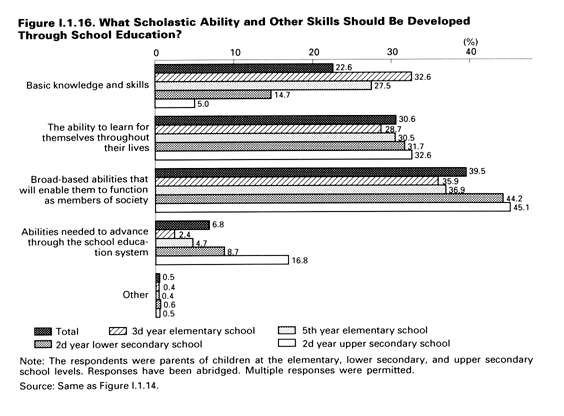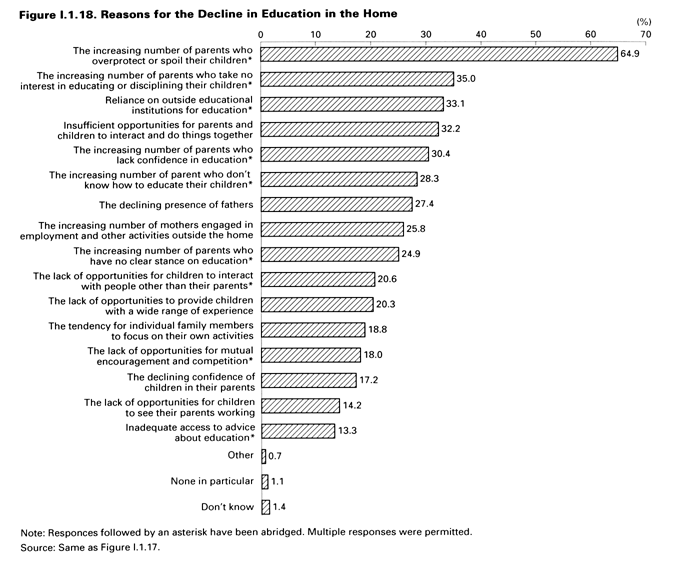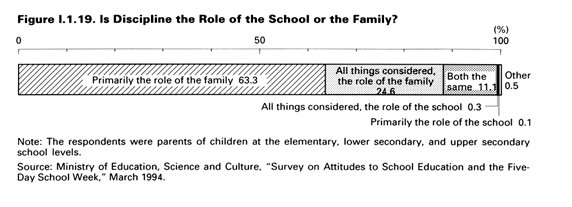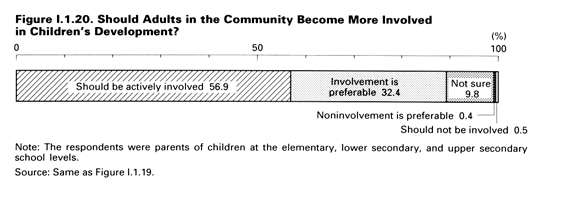| Home > Policy > White Paper, Notice, Announcement > White Paper > JAPANESE GOVERMENT POLICICIES IN EDUCATION, SCIENCE AND CULTURE 1994 > PART I Chapter 1 Section 2 1 | ||
Society has changed dramatically in recent years because of factors that include the advance of science and technology, the changing industrial structure, internationalization, and the shift to an information-oriented society. In this environment of rapid social change, people must constantly acquire new knowledge and learn to use new technology in order to cope with the demands of work and even daily life. Moreover, rising income levels and the expansion of leisure time have brought about an increase in educational activity across a wide social spectrum, including not only employed people, who are targets of what is called recurrent education, but also homemakers and the elderly. As a result, interest in education is now extremely sophisticated, and there has also been considerable diversification in the scope of that interest.
We are entering an era when people will learn not only during their youth but throughout their lives. An important task now facing us is the creation of a "lifelong learning society" in which people can freely choose learning opportunities at any time during their lives and in which there will be appropriate recognition of the achievements of such learning.
The true purpose of school education is to build a foundation for lifelong learning and to acquire what is needed for development throughout life. In reality, however, there has been a tendency in school education to attempt to teach all required knowledge and skills during the school years.
Today the knowledge and skills that we need throughout our lives are becoming increasingly sophisticated and extensive, owing to the advance of science and technology and other factors. Clearly, it has become physically impossible to teach all this knowledge in the context of school education. While it is obviously necessary to ensure that people acquire certain basic abilities and skills, attempts to teach excessively broad curricula within a limited number of years must be regarded as questionable not only from an educational standpoint but also because it is vital to foster children's ability to think, judge, and act for themselves.
We now need to move away from the notion that school education should be a self-contained process during which all required knowledge is taught. Instead we must use education to develop the qualities and skills needed to enable people to continue learning throughout their lives and to live independently in an era of dramatic change. To achieve this, it is necessary to refine the content of education to what is fundamental. School education must place particular emphasis on the development of willingness to learn independently and the skills needed to cope positively with social change. In other words, priority must be placed on the promotion of education based on a new concept of scholastic ability.
In the March 1994 survey conducted by the Ministry of Education, Science and Culture, parents were asked to state the ways in which they wanted the scholastic ability and strengths of their children to be developed through school education. The most frequent response was "broad-based abilities that will enable them to function as members of society" (39.5%), followed by "the ability to learn for themselves throughout their lives" (30.6%) and "basic knowledge and skills needed for daily life, such as reading, writing, and arithmetic" (22.6%) ( Figure I.1.16 ). A breakdown of responses according to children's level of schooling reveals that "broad-based abilities that will enable them to function as members of society" was the most frequent response at all levels and that the percentage rose with the school year, from 35.9% in the third year of elementary school to 36.9% in the fifth year of elementary school, 44.2% in the second year of lower secondary school, and 45.1% in the second year of upper secondary school. The percentage of respondents citing "the ability to learn for themselves throughout their lives" also rose with the school year, from 28.7% in the third year of elementary school to 30.5% in the fifth year of elementary school, 31.7% in the second year of lower secondary school, and 32.6% in the second year of upper secondary school. "Basic knowledge and skills needed for everyday life, such as reading, writing, and arithmetic" was the next most frequent response (32.6%) among respondents with children in the third year of elementary school, but the percentages declined at higher levels, falling to 27.5% in the fifth year of elementary school, 14.7% in the second year of lower secondary school, and 5.0% in the second year of upper secondary school.

When considering the concept of lifelong learning, it is important not only to view education as an integrated process spanning the individual's entire life, from infancy, childhood, and youth through maturity and old age, but also to focus on the interactive linkage of the educational functions of schools, families, and communities and on the enhancement of the educational function of each. Seen from this viewpoint, at present there appears to be excessive reliance on school education. There is also a clear tendency to belittle the role played by the family and the community in education.
For example, in a May 1993 survey on the view that the educational function of the family was weakening, "Opinion Survey Concerning Youth and the Family," conducted by the Public Relations Office of the Prime Minister's Office, 75.1% of respondents agreed "totally" or "somewhat" ( Figure I.1.17 ). The reason for this decline in the educational function of the family most commonly cited was "the increasing number of parents who overprotect or spoil their children or intervene excessively in their children's lives" (64.9%), followed by "the increasing number of parents who take no interest in educating or disciplining their children" (35.0%) and "reliance on outside educational institutions, such as schools and juku, for education and discipline" (33.1%) ( Figure I.1.18 ). Respondents thus blamed the decline of education in the home on the behavior of parents, either through overprotection and excessive intervention in the lives of their children or, conversely, through a lack of interest and a tendency to rely excessively on schools for education and discipline that should be provided by the family.
In the March 1994 survey conducted by the Ministry of Education, Science and Culture, however, when parents were asked to indicate whether they regarded discipline as primarily the role of the family or the school, 63.3% stated that discipline was "primarily the role of the family," while 24.6% regarded discipline as "all things considered, the role of the family." Altogether, 87.9% of respondents chose one of these two responses ( Figure I.1.19 ). These results indicate that despite criticism about the decline of education in the home, parents still regard the disciplining of children as an important function of the family. When parents were asked whether they regarded more active involvement by adults in the community important to the healthy development of children, 89.3% responded in the affirmative, with 56.9% stating that adults "should be actively involved" and 32.4% that "involvement is preferable" ( Figure I.1.20 ). It is apparent from these results that parents think that the community should be involved in children's development.
We need to be more aware of the importance of children's life in the family and the community for healthy development and of children's vital need to accumulate a rich variety of experience in everyday life. In addition to efforts in school education, enhancement of the educational functions of the family and the community is also critically important to moral and social development. Of particular importance is the role of education in the home. It is said that character formation begins with parent-child interaction and that, above all, children need to feel loved and to feel that their environment is peaceful. The provision of timely and appropriate discipline as part of family interaction plays a crucial role in education in the home. Indeed, education in the home can be regarded as the foundation of all education.
The healthy development of children thus depends on the effective realization of the educational functions of schools, families, and communities. We must recognize that healthy human development is achieved not only through school education but also through the total life experience of children in their families and communities. And from this perspective we must correct the tendency to depend excessively on school education and work instead to ensure that schools, families, and communities all play their appropriate roles in education to the full.




| Back to Top | MEXT HOME |